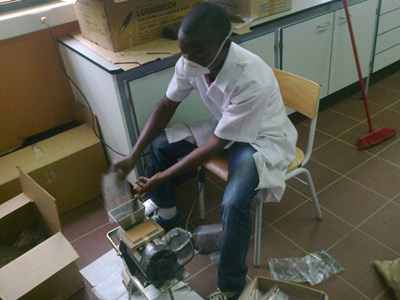|
Cycle 2 (2012 Deadline)
Ecosystem carbon analytical laboratory PI: Salomao Bandeira (Universidade Eduardo Mondlane) U.S. Partner: Ilka C. Feller (Smithsonian Environmental Research Center)
Project Dates: August 2013 to July 2015 
| | A student at the soil lab at Universidade Eduardo Mondlane operates a grinder(Photo courtesy Dr. Bandeira). |
Project OverviewIn contrast to the standard PEER projects aimed at supporting research efforts, this project was focused on upgrading the research infrastructure to facilitate future research. Specifically, the project aimed to develop an Ecosystem Carbon Analytical Laboratory (ECAL) at Universidade Eduardo Mondlane in Mozambique. With new equipment purchased with PEER funds, Dr. Bandeira and his team would be able to complete quantitative analyses of carbon content of vegetation, soil, and sediment, supporting a range of complex research associated with climate change, sustainable agriculture and forestry, and bioenergy. Beyond the enhanced equipment, the project was designed to provide a facility for education and training, as well as facilitate increased opportunities for collaboration. Building the lab provided the foundation for subsequent work to assess fluxes of carbon in upland and wetland ecosystems in Mozambique and other East African countries, including pilot Mangrove REDD+ projects in Mozambique, an initiative that would simultaneously address climate change mitigation and mangrove conservation. Final Summary of Project Activities As part of the lab set-up, PEER team members installed a CHNSO flash analyzer, one of the first of its kind in eastern Africa, as well as additional equipment used in carbon analysis. Several team members were trained in the use of the analyzer, including one designated permanently in charge of the lab. PEER team members also made technical presentations at an Africa PEER meeting, a forum for mangrove research and studies on carbon dynamics and mangrove conservation, and a workshop on mangrove carbon in the Zambezi delta.
Dr. Bandeira reports that the new lab will be extremely useful in supporting his university’s participation in two ongoing projects. One is a USAID-funded mangrove rehabilitation program (CCAP USAID) in central and northern Mozambique. It involves replanting and monitoring mangrove forests around Quelimane city, as well as studying the carbon budgets of the forest and how they vary with different forest ages and conditions. The other initiative is the PEMBA Climate Change Adaptation Program, which is designed to improve our understanding of vulnerabilities and areas of intervention, looking at habitat and carbon among other socio-ecological questions. The new lab is also encouraging more Mozambican graduate students to complete thesis research on mangrove carbon stocks and other ecosystems, as well as strengthening the efforts of researchers in the university’s marine biology group.
Back to PEER Cycle 2 Grant Recipients
| 



